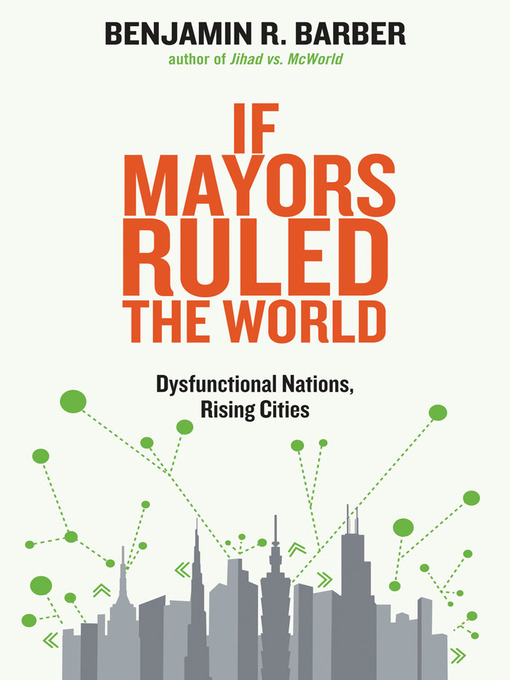
If Mayors Ruled the World
Dysfunctional Nations, Rising Cities
کتاب های مرتبط
- اطلاعات
- نقد و بررسی
- دیدگاه کاربران
نقد و بررسی

September 23, 2013
In an impassioned love letter to cities and their political leaders, Barber (Jihad vs. McWorld) celebrates the diversity and ferment that embody urban life. Modern cities, he claims, fulfill the promises of John Dewey and Walt Whitman’s paeans to democracy by allowing “democratic voices, ardent dreamers and lawless artists” to inspire each other. It is not always clear how mayors fit into this tumult of roiling humanity, but Barber calls them “possibly the best hope we have for the survival of democracy across borders.” By focusing on practical solutions to the day-to-day problems that affect their constituents, mayors champion a mode of governance characterized by collaboration and consensus, and the global ties they create offer a more human-centered, applied style of politics than the contentiousness of national legislatures or the bureaucratic talking shops of the U.N. and European Union, according to the author. Barber is more interested in crafting a metaphysics of urban life than the down-to-earth minutiae of local stewardship (he derides congestion pricing schemes, markedly successful in many cities, as “keeping-the-poor-from-driving plan” without offering any realistic alternative), and in the throes of his “longing for and expectation of an interdependent urbanity as encompassing as humanity’s perfervid imagination,” he neglects to notice that many of his castles are planted firmly in the air. Agent: Steve Wasserman, Kneerim, Williams & Bloom.

Starred review from October 15, 2013
Political theorist Barber (Center on Philanthropy and Civil Society, Graduate Center, City Univ. of New York; Consumed: How Markets Corrupt Children, Infantilize Adults, and Swallow Citizens Whole, 2007, etc.) asks whether the world's cities, and the mayors who lead them, can come together as an alternative to the failures of the nation-state. The author not only provides a positive answer, he also discusses how cities and their mayors have already collaborated for a variety of purposes and assesses the characteristics that make leagues or confederations of cities potentially viable as broader networks. Barber has no patience for the successors of Rousseau or Thomas Hardy whose "pastoral nostalgia leads them to curse the wickedness of cities." He contends that cities can provide a framework for a globalization that is "public rather than private, democratic not hegemonic, egalitarian rather than monopolistic." A parliament of cities is already emerging. In his view, the nation-state is incapable of cooperating on global issues with other states, since global cooperation violates the institutional foundation of nations. Citing historical precedents like the Hanseatic League, among others, Barber insists that local consensual problem-solving is a characteristic of mayoral offices and "seem[s] to override deficiencies in political landscape." The author reviews areas like security, the environment and global warming, and standard setting for service provisions to illustrate the many different ways in which the world's cities are coming together, and he features a multitude of organizations that have already been formed. Leaders who have stepped forward include New York's mayor Michael Bloomberg, Stuttgart, Germany's former mayor Wolfgang Schuster and the mayor/president of Singapore Tony Tan. A provocative, informative account of a different kind of globalization. Highly recommended reading for policymakers and other readers intrigued by forward-thinking forms of governance.
COPYRIGHT(2013) Kirkus Reviews, ALL RIGHTS RESERVED.

October 15, 2013
More than half of humanity now lives in cities, and, in coming decades, this proportion is only going to grow. In his new book, Barber (Ctr. on Philanthropy & Civil Society, CUNY Grad. Ctr.; Jihad vs. McWorld) argues that this is not just inevitable but desirable. The author cheers the decline of the nation-state and anticipates the rise of the city-state. He asserts that modern cities with pragmatic mayors are the political institutions that hold the most promise for reducing poverty, fighting terrorism, mitigating climate change, and building global connections. The volume is divided into 12 chapters, each cataloging the policy and civic innovations that have been engineered by cities. There are optimistic accounts of the expansion of mass transit and support for the arts and citizen participation but little reflection on challenges or quandaries. Paired with each chapter is a profile of a different mayor. These are uniformly positive and describe careers, aspirations, and accomplishments with barely a mention of pitfalls, controversy, or failure. VERDICT Barber has a knack for describing promising trends, and this work will grab the attention of readers interested in politics and urban issues. However, his almost uncritical treatment of the interrelated subjects will make this title less useful for those researching difficult policy issues.--Ahmer Qadeer, Brooklyn
Copyright 2013 Library Journal, LLC Used with permission.

























دیدگاه کاربران